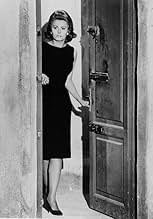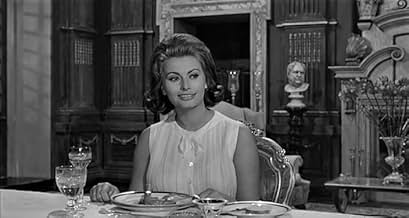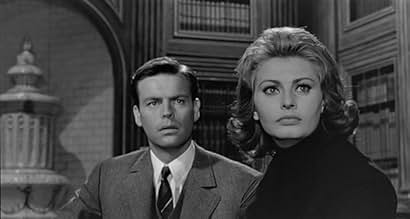Un criminale di guerra tedesco impazzito vive in una casa isolata di proprietà del ricco padre che gli fa credere che la guerra sia ancora in corso 15 anni dopo i fatti.Un criminale di guerra tedesco impazzito vive in una casa isolata di proprietà del ricco padre che gli fa credere che la guerra sia ancora in corso 15 anni dopo i fatti.Un criminale di guerra tedesco impazzito vive in una casa isolata di proprietà del ricco padre che gli fa credere che la guerra sia ancora in corso 15 anni dopo i fatti.
- Regia
- Sceneggiatura
- Star
- Premi
- 2 vittorie e 1 candidatura in totale
Carlo Antonini
- Police Official
- (non citato nei titoli originali)
Antonia Cianci
- Maid
- (non citato nei titoli originali)
Alfredo Franchi
- Groundskeeper
- (non citato nei titoli originali)
Roberto Massa
- Chauffeur
- (non citato nei titoli originali)
Osvaldo Peccioli
- Cook
- (non citato nei titoli originali)
Lucia Pelella
- Groundskeeper's wife
- (non citato nei titoli originali)
Recensioni in evidenza
The Condemned of Altona.
This is a film I saw a few times and would like to see again 40 years later. Based on Jean-Paul Sartre about WW2 and the NEW Germany in German eyes. The central character, Franz Gerlach, has kept himself locked in the attic of his father's house for many years because his Nazi Past. Sophia Loren as Johanna visits him in the attic. Loren and all the actors play difficult parts. Reminds me of Boll and Gunther Grass. Those Germans who can not forget what happened in World War 2. A 10 from me, a must see Drama that has been done on stage too. Is there a DVD Copy available? I saw it on TV and at the Cinema in the 1960's.
This is a film I saw a few times and would like to see again 40 years later. Based on Jean-Paul Sartre about WW2 and the NEW Germany in German eyes. The central character, Franz Gerlach, has kept himself locked in the attic of his father's house for many years because his Nazi Past. Sophia Loren as Johanna visits him in the attic. Loren and all the actors play difficult parts. Reminds me of Boll and Gunther Grass. Those Germans who can not forget what happened in World War 2. A 10 from me, a must see Drama that has been done on stage too. Is there a DVD Copy available? I saw it on TV and at the Cinema in the 1960's.
While this film was not entirely successful, there are scenes that will stay in your mind forever! If you liked Von Trier's "Zentropa", you will like this film on a similar theme.
... from director Vittorio De Sica. German shipping magnate Fredric March learns that he has six months left to live. He summons his son Robert Wagner and daughter-in-law Sophia Loren to his palatial estate in order to set plans for his passing. Loren, who resents Germany's Nazi past and March's role in it, learns that March's older son (Maximilian Schell), believed long dead, has lived in seclusion since the end of the war, so she sets out to learn why he is hidden away. Also with Francoise Prevost and Gabriele Tinti.
This must have been a major European release at the time, as De Sica was one of the most respected directors, and Loren and Schell had just won the lead acting Oscars. It's heavy stuff, with the examination of German culpability for Nazi atrocities a thorny subject. The version I watched was in Italian with subtitles, so it was odd seeing March, Schell and Wagner dubbed with others' voices.
This must have been a major European release at the time, as De Sica was one of the most respected directors, and Loren and Schell had just won the lead acting Oscars. It's heavy stuff, with the examination of German culpability for Nazi atrocities a thorny subject. The version I watched was in Italian with subtitles, so it was odd seeing March, Schell and Wagner dubbed with others' voices.
When a movie from 1962 has less than 200 votes on IMDb, what does it mean? Directed by legendary De Sica, and starring great Sophia Loren... it must be a terrible failure? Well, it isn't.
Having read Sartre's play "The Condemned of Altona", it is my impression that the movie is very faithful to its atmosphere. There are some changes, of course: instead of concentrating exclusively on torturing his characters inside the mansion (as Sartre does), De Sica takes advantage of possibilities of film, adding outdoor scenes.
I don't want to reveal the plot, although it is very interesting. I recommend reading the play first, since the relations between characters will be clearer then. Anyway, see this movie if you get the chance!
Having read Sartre's play "The Condemned of Altona", it is my impression that the movie is very faithful to its atmosphere. There are some changes, of course: instead of concentrating exclusively on torturing his characters inside the mansion (as Sartre does), De Sica takes advantage of possibilities of film, adding outdoor scenes.
I don't want to reveal the plot, although it is very interesting. I recommend reading the play first, since the relations between characters will be clearer then. Anyway, see this movie if you get the chance!
I always regarded "The Prisoners of Altona" as Sartre's most interesting and perhaps best play, but I did not know that Vittorio de Sica had made a film on it and with Sophia Loren and other great actors, Cesare Zavattini having even somewhat added to the play. The main interest of the play is that it's a Frenchman's assessment of the post-war German situation with acute observations, conclusions and profound considerations. The main character Franz has never left the war behind, while his father, a great industrialist tycoon, has received his own death sentence by a cancer diagnosis and faces the problem and necessity of allowing his life's work a continuity. He has another son (Sophia Loren's husband, Robert Wagner,) who is willing to accept to take over, but his elder brother looms as the bearer of an ominous destiny of the family. Franz (Maximilian Schell) ultimately refuses to accept that Germany is flourishing again, that it is rising to new power and prosperity and clinches to his experience of a defeated nation all in ruins with its people resorting to underground beggary and scavenging, as if the reality of its ruin was of greater comfort to him than any news of its prosperity. Vittorio de Sica made this film two years after "Two Women", and it's in the same vein - relentless realism brought to overwhelming pathos and tragedy. He alternated his serious films with comedies and loved to act himself in comedies, he was more active as an actor and comedian than as a director, but his serious films remain his masterpieces. There is no sweet and lovely Italian music here but the bleak and depressive wailing disharmonies of Shostakovich instead, which actually provide an appropriate mood and accompaniment to this very morose film. It's not one of his best films, but it certainly belongs to his most interesting.
Lo sapevi?
- QuizSpencer Tracy was offered but declined the role of Albrecht von Gerlach.
- BlooperNazi uniforms were banned after the war, yet Franz walks through the city without being arrested or beaten up. He gets a few strange looks but is otherwise ignored.
- Versioni alternativeEvery reference to National Socialism was cut from the West German version in 1962.
I più visti
Accedi per valutare e creare un elenco di titoli salvati per ottenere consigli personalizzati
- How long is The Condemned of Altona?Powered by Alexa
Dettagli
- Data di uscita
- Paesi di origine
- Lingue
- Celebre anche come
- The Condemned of Altona
- Luoghi delle riprese
- Aziende produttrici
- Vedi altri crediti dell’azienda su IMDbPro
Botteghino
- Lordo Stati Uniti e Canada
- 2.398.000 USD
- Tempo di esecuzione
- 1h 54min(114 min)
- Colore
- Mix di suoni
- Proporzioni
- 2.35 : 1
Contribuisci a questa pagina
Suggerisci una modifica o aggiungi i contenuti mancanti

























